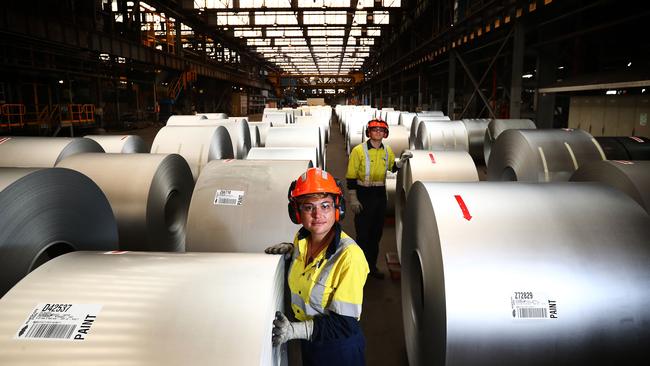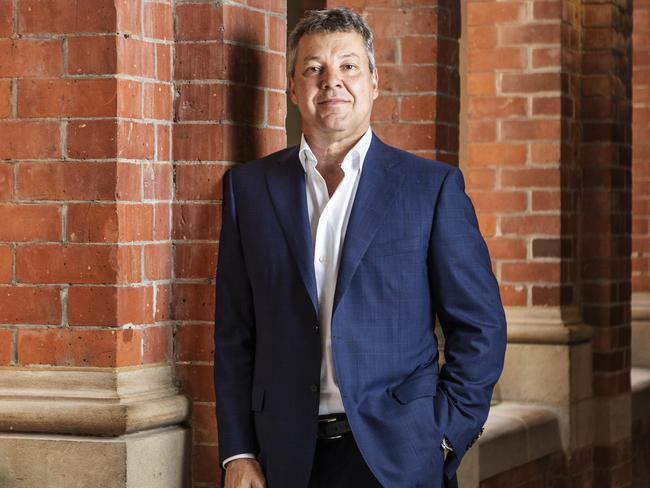BlueScope Steel profit slumps 90c, sees Covid-fuelled shift from inner cities
The steelmaker already sees building trends signalling a move to outer suburbs and regions as more people work from home.

Australia’s urban sprawl could widen in the wake of the coronavirus crisis, according to BlueScope Steel boss Mark Vassella, as city workers look to work from the suburbs or regional centres rather than live in inner city apartment blocks.
Mr Vassella told reporters on Monday the steel major had seen an uptick in residential home building sales in suburbia and regional areas in the second half of the financial year, as home-based workers looked to renovate rather than spend cash on travel.
And the BlueScope boss said he expected that trend to accelerate as Australia recovered from the coronavirus crisis and home-based work became embedded into corporate culture, saying he expected lower growth in inner city high-density developments as a result.
“There is no question that we’ve started to see and hear — and actually sell products — to regional areas. We’re seeing a strong pipeline of construction, and it’s our sense at this stage that perhaps the rush to higher density living, like high rise apartments, might be something that is reassessed. And that’s perfect for us in terms of the products we sell,” he said.
“I wouldn’t say that there’s been a fundamental shift and all of a sudden hundreds of thousands more tonnes into regional areas. But I suspect that coming out of COVID-19 people are going to think about things like regional hubs, regional centres, working from home, use of technology, every differently than they might have back in February this year.”
BlueScope maintained its final dividend despite a 90 per cent crash in its net profit, with the company saying it remains in a strong position to withstand the worst the coronavirus crisis has thrown at it.
BlueScope declared an 8c a share final dividend on Monday, on net profits of $96.5m, down from $1bn a year ago.
Its statutory results were hit by a $197m writedown of its New Zealand business, and BlueScope said underlying profits of $353m were down 63 per cent on the previous financial year, on lower steel prices and the impact of the coronavirus on key markets.
But the company left its on-market buyback scheme on hold after electing to push ahead with the expansion of its US steel making businesses, saying it would only reinstate the buyback program if there was a “demonstrable” improvement in business conditions.
Mr Vassella said in a statement the company was evolving its business strategy to cope with economic changes driven by the pandemic.
“We believe we are well positioned to address likely post-COVID-19 emerging societal trends, such as a shift in preferences towards lower density suburban and regional/rural residential housing demand; a rise in home improvements and extensions activity; enhanced focus on e-commerce and logistics growth, and the onshoring or localisation of supply chains,” he said.
Underlying EBIT for BlueScope’s Australian business still fell for the year, to $305.1m from $535.1m the previous financial year. But the company said earnings in the second half of the financial year were stronger than in the first, at $177.2m, with sales of steel products into the construction sector up 2 per cent compared to the first half.
“In a year where in the second half we might have expected volumes to drop off, the Australian sales actually increased, year-on-year. If you’d said to me six months ago that I could finish the year slightly up, year-on-year, I’d have taken it without hesitation,” Mr Vassella said.
The Australian steel major finished June in a $79m net cash position, after changes to the way it accounts for operating leases. Without those accounting changes, the company said, it would have a net cash position of $509m.
Mr Vassella said BlueScope had strong financial liquidity of $3.1bn at June 30, having increased and extended its core syndicated bank facilities in May.
“With all these metrics combined, BlueScope is a company capable of withstanding some of the toughest conditions that the economy has thrown at us. Accordingly, the board has approved the payment of an 8c per share final dividend – in line with last year,” he said.
It booked revenue of $11.3bn for the year, down 10 per cent, and underlying earning before interest and tax of $564m, down 58 per cent.
BlueScope said the ongoing uncertainty meant it could not provide earnings guidance for the first half of the current financial year, saying it would update the market at its annual shareholder meeting in November.
BlueScope shares closed up 28c, or 2.3 per cent, at $12.35 on Monday.

Bxx




To join the conversation, please log in. Don't have an account? Register
Join the conversation, you are commenting as Logout